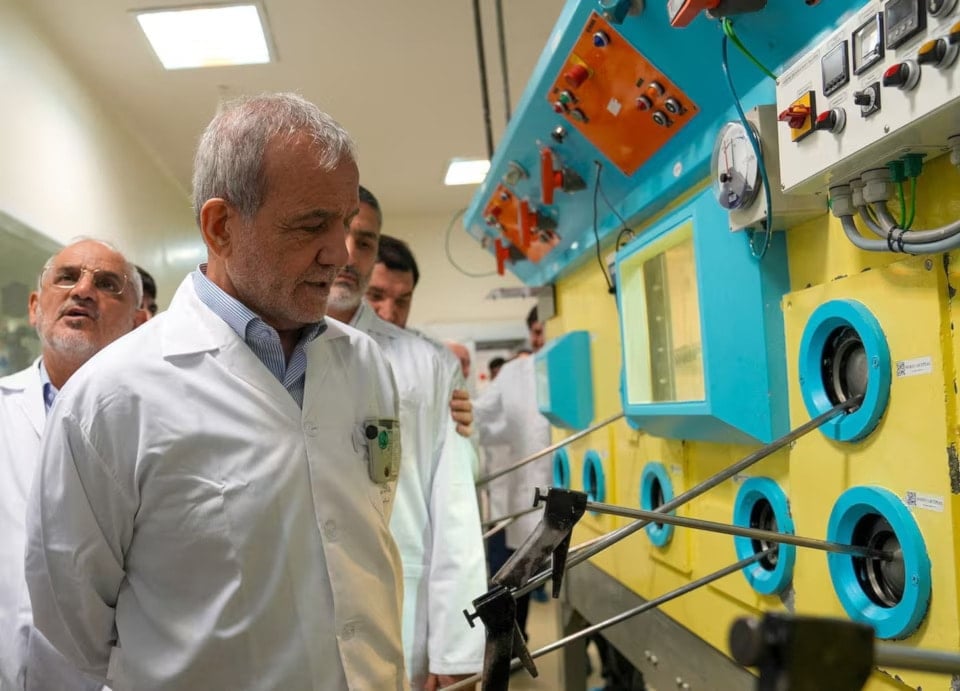Pezeshkian vows to rebuild Iran nuclear feats stronger than before
The Iranian president underscores Iran’s advancements in radiopharmaceuticals and nuclear medicine during a visit to the Atomic Energy Organization of Iran.
-

Iranian President Masoud Pezeshkian visits the Iranian Atomic Energy Organization in Tehran, Iran, November 2, 2025 (WANA)
During his visit to the Atomic Energy Organization of Iran (AEOI), Iranian President Masoud Pezeshkian toured an exhibition that highlighted the most recent accomplishments of the nation's nuclear scientists in healthcare, medical technology, and radiopharmaceutical production, after which he held a cordial meeting with the organization's senior officials.
Honoring the memory of the martyrs of the 12-day imposed war and Iran’s nuclear scientists, President Pezeshkian described the efforts of the country’s nuclear experts as a form of scientific jihad and a sincere service to the nation.
He further stressed that the production of radiopharmaceuticals and the development of modern medical technologies are essential national needs that must be pursued with greater speed and determination.
Arrogant powers want to keep independent nations dependent
Highlighting Iran’s strong position in radiopharmaceutical production and its potential in the global medical market, Pezeshkian said, "For our country, embracing advanced technologies and entering the global competition is vital," adding that "arrogant powers seek to deprive independent nations, including Iran, of access to modern technologies, keeping them dependent on assembly industries while they produce and sell medicines at exorbitant prices.”
The Iranian president called for a strategic plan to increase Iran’s share in the global radiopharmaceutical market, emphasizing that while meeting domestic needs remains a priority, export development and professional marketing must also be pursued. “Our products’ quality, effectiveness, and affordability will make Iran a leader in this field,” he emphasized.
President Pezeshkian stated that the hostility and assassinations targeting Iranian scientists stem from the concern of major powers over Iran’s scientific and technological independence, emphasizing that Iran has repeatedly declared that developing nuclear weapons is not part of its agenda, a fact of which he stated world powers are well aware.
Joint 'Israel'-US attacks target Iran's nuclear sites
On June 19, 2025, Iran confirmed that its Khondab nuclear site had been struck and held the International Atomic Energy Agency responsible for its “inaction”. This incident marked one of the first publicly acknowledged attacks on Iranian nuclear infrastructure in recent weeks, with the Iranian authorities condemning the strike as an assault on their sovereignty.
Then, on June 22, 2025, Iran reported minor damage to its nuclear facilities following US military strikes. The attack targeted the nuclear sites at Fordow, Natanz, and Isfahan. Iran emphasized that there had been no release of radiation, insisted that its core nuclear infrastructure remained intact, and warned of a measured response while reaffirming the peaceful nature of its nuclear program.
In the hours immediately before or after the June 22 strikes, satellite imagery suggested preparatory activity at the Isfahan site: trucks dumping soil into tunnels at the Isfahan facility on June 23, 2025, were observed, a move interpreted as an early warning of the incoming strike.
The Iranian response to these events was characterized by accusations that major powers feel threatened by Iran’s technological independence and by pledges to maintain the country’s scientific self‑sufficiency.

 3 Min Read
3 Min Read










